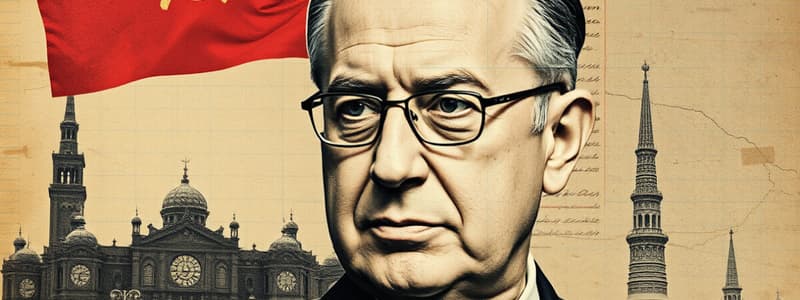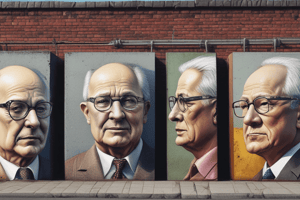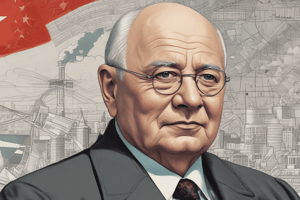Podcast
Questions and Answers
Seven out of ten biologists believe that the planet is experiencing an alarming extinction of both plant and animal species.
Seven out of ten biologists believe that the planet is experiencing an alarming extinction of both plant and animal species.
True (A)
What does NGOs stand for?
What does NGOs stand for?
Nongovernmental Organizations
Which of the following is a common slogan among grassroots social movements?
Which of the following is a common slogan among grassroots social movements?
- Act globally, think locally
- Save the planet
- Local is better
- Think globally, act locally (correct)
The number of international NGOs has increased from 176 in 1910 to ___ today.
The number of international NGOs has increased from 176 in 1910 to ___ today.
What event occurred on December 21, 1988?
What event occurred on December 21, 1988?
What organization is associated with the hijackers of September 11, 2001?
What organization is associated with the hijackers of September 11, 2001?
Who was the leader of al-Qaeda?
Who was the leader of al-Qaeda?
The Taliban cooperated with the U.S. in efforts against al-Qaeda.
The Taliban cooperated with the U.S. in efforts against al-Qaeda.
What military action did the U.S. take in October 2001?
What military action did the U.S. take in October 2001?
What did President George W. Bush threaten to do regarding Saddam Hussein?
What did President George W. Bush threaten to do regarding Saddam Hussein?
The Iraq War officially began in March 2003.
The Iraq War officially began in March 2003.
What are the three major groups in Iraqi society?
What are the three major groups in Iraqi society?
What was the term used for foreign workers in Western Europe during the 1950s and 1960s?
What was the term used for foreign workers in Western Europe during the 1950s and 1960s?
Which party was led by Jean-Marie Le Pen in France?
Which party was led by Jean-Marie Le Pen in France?
___ and Western influences led to the rise of Islamic fundamentalism in the late 20th century.
___ and Western influences led to the rise of Islamic fundamentalism in the late 20th century.
Who was the Pope from 1978 to 2005?
Who was the Pope from 1978 to 2005?
What major theme is expressed in Neo-Expressionist art?
What major theme is expressed in Neo-Expressionist art?
What was a significant outcome of globalization?
What was a significant outcome of globalization?
The World Trade Organization was established in 1995.
The World Trade Organization was established in 1995.
What major crisis is caused by global warming?
What major crisis is caused by global warming?
Who became the general secretary of the Soviet Party in March 1985?
Who became the general secretary of the Soviet Party in March 1985?
What does perestroika refer to?
What does perestroika refer to?
What was glasnost?
What was glasnost?
What was one major consequence of Gorbachev's reforms?
What was one major consequence of Gorbachev's reforms?
Who was the president of Russia that succeeded Gorbachev?
Who was the president of Russia that succeeded Gorbachev?
What was the main reason for the Chechen conflict?
What was the main reason for the Chechen conflict?
Vladimir Putin was a member of the KGB before becoming president.
Vladimir Putin was a member of the KGB before becoming president.
Who was the head of Solidarity and became the president of Poland?
Who was the head of Solidarity and became the president of Poland?
What significant event occurred on November 9, 1989, in East Germany?
What significant event occurred on November 9, 1989, in East Germany?
What happened to Czechoslovakia on January 1, 1993?
What happened to Czechoslovakia on January 1, 1993?
Match the following countries with their related events:
Match the following countries with their related events:
Slobodan Milosevic embraced a policy of ethnic cleansing.
Slobodan Milosevic embraced a policy of ethnic cleansing.
What was the result of the Dayton Accords signed in December 1995?
What was the result of the Dayton Accords signed in December 1995?
The Kosovo Liberation Army (KLA) was founded to oppose Serbian rule in _______
The Kosovo Liberation Army (KLA) was founded to oppose Serbian rule in _______
Who was the chancellor of Germany during the economic boom in the mid-1980s?
Who was the chancellor of Germany during the economic boom in the mid-1980s?
What characterized the economic situation in Eastern Germany during Kohl's chancellorship?
What characterized the economic situation in Eastern Germany during Kohl's chancellorship?
Who became the first female chancellor in German history?
Who became the first female chancellor in German history?
What year did Tony Blair become the prime minister of the United Kingdom?
What year did Tony Blair become the prime minister of the United Kingdom?
Who succeeded Tony Blair as prime minister?
Who succeeded Tony Blair as prime minister?
What was Jacques Chirac's role in French politics?
What was Jacques Chirac's role in French politics?
What major event caused Tony Blair's popularity to plummet?
What major event caused Tony Blair's popularity to plummet?
Which countries joined the EU in 2004?
Which countries joined the EU in 2004?
The Maastricht Treaty created the European Union.
The Maastricht Treaty created the European Union.
The common currency adopted by twelve EU nations in 1999 is called the _____
The common currency adopted by twelve EU nations in 1999 is called the _____
What significant change occurred to the European Community (EC) on January 1, 1994?
What significant change occurred to the European Community (EC) on January 1, 1994?
Who was the Italian prime minister who dominated politics primarily to protect his business interests?
Who was the Italian prime minister who dominated politics primarily to protect his business interests?
George W. Bush won the popular vote in the 2000 presidential election.
George W. Bush won the popular vote in the 2000 presidential election.
What significant natural disaster occurred during George W. Bush's presidency that affected his popularity?
What significant natural disaster occurred during George W. Bush's presidency that affected his popularity?
What was the primary motive for the formation of the Irish Republican Army (IRA)?
What was the primary motive for the formation of the Irish Republican Army (IRA)?
What international event sparked a military conflict involving the United States in 1990?
What international event sparked a military conflict involving the United States in 1990?
Flashcards are hidden until you start studying
Study Notes
Mikhail Gorbachev
- Became a member of the Party's Central Committee in 1978, later elected general secretary in March 1985.
- Sought radical reforms amid evident economic problems and declining living standards in the Soviet Union.
- Introduced political changes, forming the Congress of People's Deputies in 1989 and legalizing other political parties in 1990.
Perestroika and Glasnost
- Perestroika aimed to reform the economy, initiating limited market policies and private enterprise.
- Glasnost, meaning "openness," encouraged public discussion about the Soviet Union's strengths and weaknesses.
- Official media began reporting on corruption and protests, promoting more transparency.
Union of Soviet Socialist Republics
- A multiethnic state comprising 92 nationalities and 112 languages, facing renewed ethnic tensions as Gorbachev relaxed control.
- Ethnic groups took advantage of glasnost, leading to protests and violent conflicts that the weakened Soviet army struggled to manage.
Boris Yeltsin
- Elected president of the Russian Republic in June 1991, Yeltsin collaborated with Gorbachev during turbulent reforms.
- Gorbachev was arrested by hard-liners, leading to the USSR's eventual disintegration.
Commonwealth of Independent States
- Following independence votes from various republics, Ukraine declared independence on December 1, 1991.
- The USSR officially ended as leaders of Russia, Ukraine, and Belarus established the Commonwealth of Independent States.
- Yeltsin assumed command after Gorbachev's resignation on December 25, 1991, and faced economic challenges and organized crime.
Chechnya
- Yeltsin's reforms faced criticism due to economic inequality and corruption, alongside ongoing war for Chechnya's independence.
- Yeltsin won re-election in 1996, but his health issues raised concerns about his governance.
Vladimir Putin
- Succeeded Yeltsin at the end of 1999 and aimed to centralize power to address societal issues.
- Criticized for silencing media and opponents, yet gained support for restoring pride and discipline.
- Became prime minister in 2008, sharing power with President Dmitry Medvedev before reassuming the presidency in 2012.
Chechnya Continued
- Putin focused on reestablishing control over Chechnya and initiating economic reforms, despite ongoing violence.
- Efforts led to improved budget and economic growth but underlying issues persisted.
Lech Walesa and Solidarity
- In 1988, Poland's regime agreed to free elections, resulting in Solidarity's coalition government.
- Lech Walesa, head of Solidarity, became president in December 1990, marking the end of Communist rule.
Vaclav Havel
- Czechoslovakia experienced significant demonstrations in 1989, leading to the collapse of the Communist government.
- Dissident playwright Vaclav Havel became president in December 1989 and advocated for democracy.
Czech Republic and Slovakia
- Czechoslovakia's non-violent transition faced ethnic tensions and disagreement on state structure.
- The peaceful division into the Czech Republic and Slovakia occurred on January 1, 1993.
Fall of the Berlin Wall
- Economic struggles and oppression in East Germany led to extensive demonstrations in 1989.
- The Berlin Wall fell on November 9, 1989, culminating in German reunification on October 3, 1990.
Yugoslavia
- Post-WWII, Yugoslavia was held together by Marshal Tito; after his death, nationalistic sentiments grew.
- Slovenia and Croatia declared independence in June 1991, leading to conflict with Serbian forces.
Slobodan Milosevic
- Serbian nationalist who dismissed efforts for multi-ethnic independence arrangements, exacerbating tensions in Yugoslavia.
Ethnic Cleansing
- Serbian forces in Bosnia engaged in ethnic cleansing, resulting in significant civilian casualties and widespread displacement.
Bosnia
- NATO intervention in 1995 included airstrikes to address humanitarian crises, leading to a peace treaty that divided Bosnia into two entities.
Kosovo
- Conflict in Kosovo arose from ethnic Albanian desires for autonomy, suppressed by Milosevic's nationalistic policies.
- NATO intervened with airstrikes after Milosevic refused a peace agreement, ultimately leading to his ousting.
Helmut Kohl, Gerhard Schroeder, and Angela Merkel
- Kohl faced challenges with the economic revitalization of Eastern Germany; his party lost power to Social Democrats.
- Schroeder struggled with economic issues before Merkel became Germany's first female chancellor in 2005, addressing health care and energy reforms.
Tony Blair and Gordon Brown
- Blair led a Labour Party resurgence in 1997, promoting centrist policies and supporting the U.S. in the War on Terror.
- His controversial support for the Iraq War led to declining popularity, allowing Gordon Brown to assume office in 2007.
Jacques Chirac and Nicolas Sarkozy
- France in 1993 faced high unemployment; conservative coalitions gained significant control in the National Assembly.### France's Political Shift
- Jacques Chirac, conservative mayor of Paris, became president in 1995 and was reelected in 2002, solidifying a rightward shift.
- Rising unemployment and immigration from North Africa increased resentment toward foreign-born residents by 1995.
- Chirac advocated for tighter immigration restrictions and proposed policies to deport illegal immigrants, famously stating, "France cannot accept all of the wretched of the earth."
- In 2005, young Muslims in Paris suburbs rioted, protesting poor living conditions and lack of job opportunities for immigrants.
- Although government officials pledged reforms post-riots, tensions between the Muslim community and wider French society have persisted, remaining a source of social unrest.
- Nicolas Sarkozy, elected in 2007, promised to address these issues but struggled to find effective solutions.
Italian Political Landscape
- Corruption plagued Italian politics in the 1990s, leading to investigations of hundreds of politicians and business leaders.
- In 1996, Italian voters shifted power to a center-left coalition, including the Communists, due to widespread disgust over corruption.
- Silvio Berlusconi, prominent media mogul, dominated politics despite initially entering to protect his business interests, serving as prime minister twice (2001-2006, 2008-2011).
- Economic crises post-2008 led to Mario Monti's appointment as prime minister, who implemented unpopular reforms, ultimately resigning in 2012.
- Enrico Letta became prime minister following elections in 2013, leading a coalition government.
European Community and Union
- By 1995, the European Community (EC) expanded to fifteen members with Austria, Finland, and Sweden, focusing primarily on economic integration.
- The EC, serving 370 million people, became the world's largest trading entity, conducting a quarter of global commerce by 2000.
- The Maastricht Treaty in 1992 sought to create an economic and monetary union, transitioning the EC to the European Union (EU) in 1994.
- The euro was introduced as a common currency for twelve EU nations in 1999, replacing seventeen national currencies by January 2013.
- The eurozone faced a major crisis in 2010 with Greece's debt, prompting financial support initiatives from other EU countries.
EU Developments
- The Lisbon Treaty ratified in 2009 aimed to enhance EU governance and foreign policy effectiveness but faced critique for lack of unity among member states.
- The EU aimed to strengthen ties with eastern and southeastern Europe, imposing membership qualifications focused on democracy and market capitalism.
- In May 2004, ten new members joined the EU, increasing its population to 455 million, with Bulgaria, Romania, and Croatia joining later.
U.S. Political Transition
- Bill Clinton's presidency (1993-2001) marked a shift back to the Democratic Party and emphasized fiscal responsibility alongside a conservative social agenda.
- Clinton's administration focused on reducing the budget deficit and reforming welfare but was overshadowed by a scandal involving his affair leading to impeachment proceedings.
- George W. Bush narrowly won the 2000 election, benefiting from a controversial Supreme Court decision despite losing the popular vote.
Key Events During Bush's Tenure
- The establishment of the Department of Homeland Security post-9/11 aimed to bolster U.S. terrorist threat defenses.
- Hurricane Katrina in 2005 severely impacted Bush's popularity, highlighting failures in disaster response amid ongoing discontent over the Iraq War.
- The Iraq War, initiated in 2003, followed claims about Saddam Hussein's weapons of mass destruction and ties to terrorism, leading to a swift military victory but long-term instability.
Terrorism and the War on Terror
- September 11, 2001, marked a pivotal moment in U.S. history, with coordinated terrorist attacks by al-Qaeda resulting in nearly three thousand deaths.
- Osama bin Laden, leader of al-Qaeda, was ultimately killed in 2011, following a long U.S. military campaign against terrorism.
- The Taliban in Afghanistan was targeted following the 9/11 attacks, resulting in a significant military engagement and ongoing challenges in establishing stability in the region.### Iraqi Conflict and Government Formation
- Saddam Hussein’s capture did not end the insurgency, as supporters and militants continued to resist U.S. forces.
- U.S. efforts aimed at training an Iraqi military to combat insurgency and establish a government for free elections.
- Tensions among the three primary Iraqi groups—Shi'ite Muslims, Sunni Muslims, and Kurds—complicated the formation of a unified government.
- By 2006, violence escalated, leading to fears of a civil war, particularly between Shi'ites in the south and Sunnis in central Iraq.
- An increase in American troop levels in 2007 contributed to a stabilization of the situation within a year.
- U.S. and Iraqi officials agreed to a complete troop withdrawal by 2011, achieved under the Obama administration.
Guest Workers in Western Europe
- Post-WWII economic revival and declining birth rates led Western European countries to seek foreign labor.
- Guest workers—mainly from Turkey, Eastern Europe, North Africa, and former colonies—were recruited to fill labor shortages.
- By the 1980s, about 15 million guest workers (5-6% of the population) resided in Europe, with significant percentages in countries like Switzerland (17%) and Germany (10%).
Rise of Right-Wing Political Parties
- Economic distress fueled a rise in antiforeign sentiment, leading to the emergence of right-wing parties.
- Jean-Marie Le Pen's National Front in France and Jörg Haider's Freedom Party in Austria advocated for immigration restrictions and nationalist policies.
- Marine Le Pen's National Front received a significant electoral boost in 2012, reflecting increasing nationalism.
- Organized violence against immigrants rose during the early 1990s, exacerbating social tensions.
Neo-Nazism and Skinheads
- Neo-Nazi groups espouse racist and anti-Semitic ideologies, rooted in white supremacy.
- Skinheads represent a youth subculture aligned with these extremist beliefs, active in both Europe and the United States.
Fundamentalism in Christianity and Islam
- Christian fundamentalism arose to counter secularism and Darwinian theories, influencing U.S. politics and candidates.
- Islamic fundamentalism seeks a return to traditional values and has evolved into militant movements aiming to resist Western influences, most notably seen in groups like the Taliban.
Pope John Paul II's Influence
- Pope John Paul II (1920-2005), a pivotal figure in the Catholic Church during the 1980s and 1990s, emphasized social justice and spirituality.
- His papacy marked the first non-Italian pope in centuries and he undertook extensive global travels to reinforce Catholic doctrine against modern secular challenges.
Neo-Expressionism in Art
- The 1980s saw Neo-Expressionism flourish, with artists like Anselm Kiefer and Jean-Michel Basquiat gaining prominence.
- Kiefer explored subjects of German history and Nazism, seeking reconciliation through his art.
- Basquiat transitioned from graffiti to contemporary art, gaining fame during the marketplace boom.
Cultural Shifts: Grunge and Hip-Hop
- Disenchantment with consumerism in the Reagan era led to the rise of grunge music, characterized by raw, angst-filled expressions and a rejection of material excess.
- The emergence of gangsta rap in the early 1990s presented unapologetic depictions of violence and lifestyle rooted in struggle and street culture.
Emergence of Microsoft and the Digital Age
- The invention of the microprocessor spurred the growth of the digital age, with companies like Microsoft becoming central to the tech industry.
- Bill Gates became the world's richest man, due to innovations that revolutionized communication and entertainment.
Communication Innovations
- The advent of email, cell phones, and the iPod transformed communication styles and music distribution.
Popular Cinema and Cultural Impact
- Fantasy films like "The Lord of the Rings" and "Harry Potter" gained global popularity through adaptations that showcased epic storytelling and moral themes.
- Artistic innovation in film was driven by advancements in digital technology and special effects.
Exploration of Multiculturalism
- Contemporary art often explores the intersection of Western and non-Western cultures, reflecting on hybrid identities driven by globalization.
Globalization and Economic Interdependence
- Globalization describes the growing interdependence of nations, influenced by technological advancements and communication systems.
- This phenomenon has shaped a global economy with increasing connectivity and economic relations worldwide.
Influence of the World Bank and Multinational Corporations
- The World Bank and IMF were established post-WWII to support economic development and oversee the global financial system.
- Multinational corporations like Siemens and ExxonMobil play a pivotal role in global industrial production, contributing to an interconnected economy.
GATT and WTO's Role in Trade
- The General Agreement on Tariffs and Trade (GATT) initiated in 1947 was replaced by the World Trade Organization (WTO) in 1995 to facilitate global trade agreements.
- Criticism surrounds the WTO for its perceived neglect of social and environmental issues, contributing to inequalities between rich and poor nations.
Environmental Threats and Global Warming
- Global warming, driven by greenhouse gas emissions, poses significant threats like rising sea levels and biodiversity losses.
- Recognized as a pressing global issue, experts emphasize the catastrophic potential of climate change in the coming decades.
Activism and NGOs
- Grassroots movements have arisen to address global issues, highlighted by the growth of NGOs advocating for a range of social and environmental concerns.
- The rise of thousands of NGOs reflects a collective awareness of global problems, with many actively attending UN discussions.
Studying That Suits You
Use AI to generate personalized quizzes and flashcards to suit your learning preferences.




